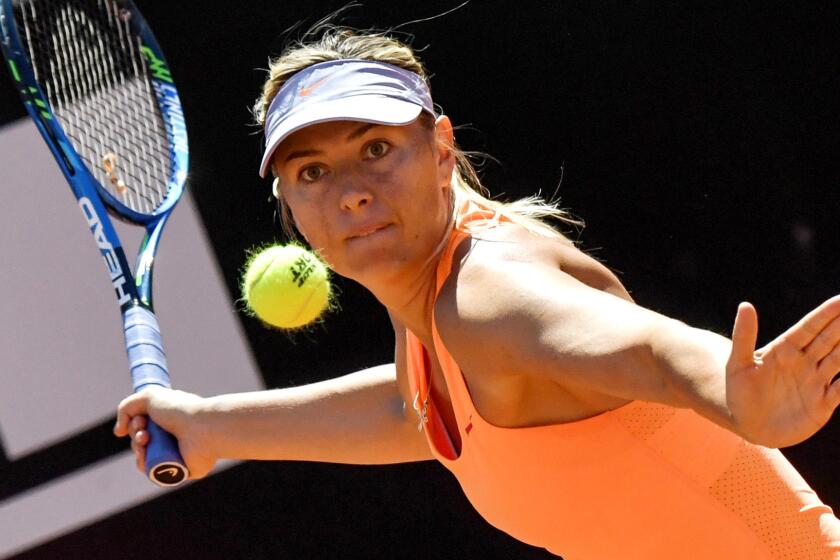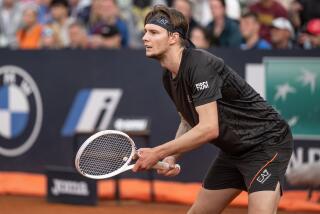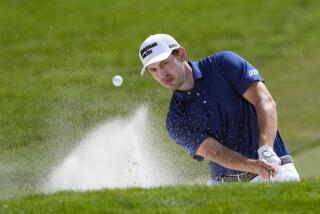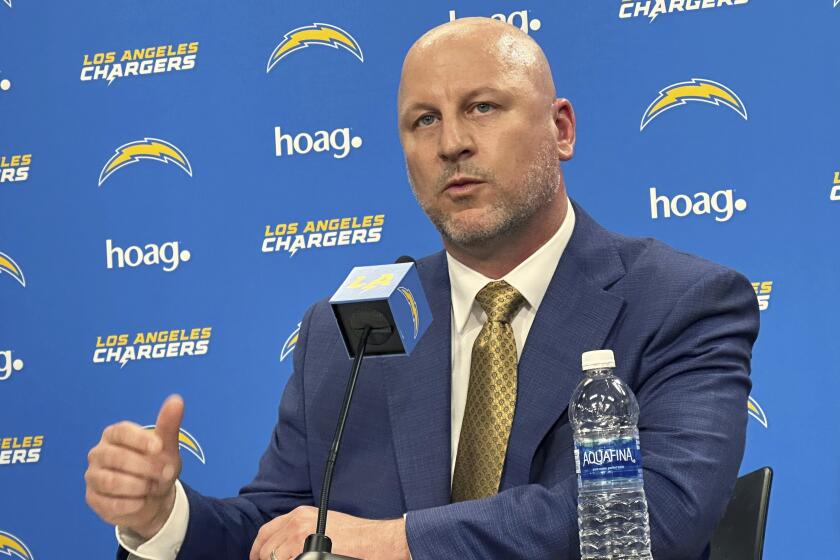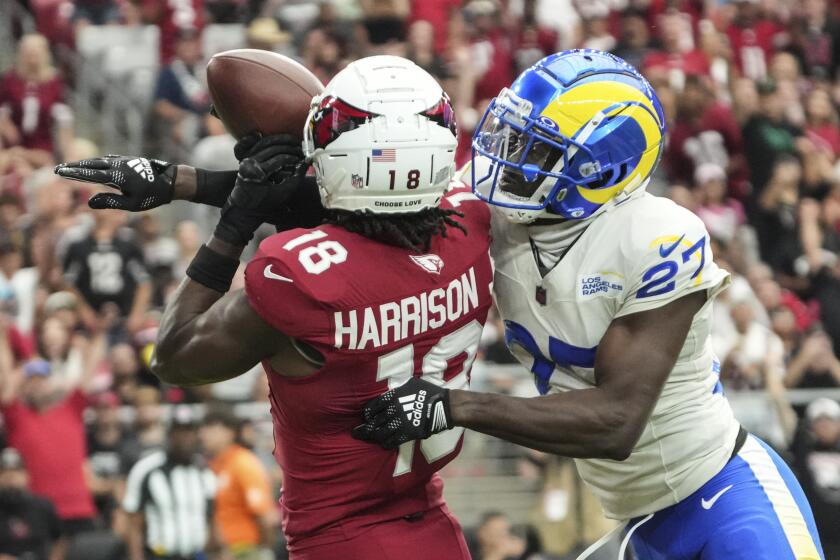Bob and Mike Bryan chasing a few more big wins to cap their prolific careers
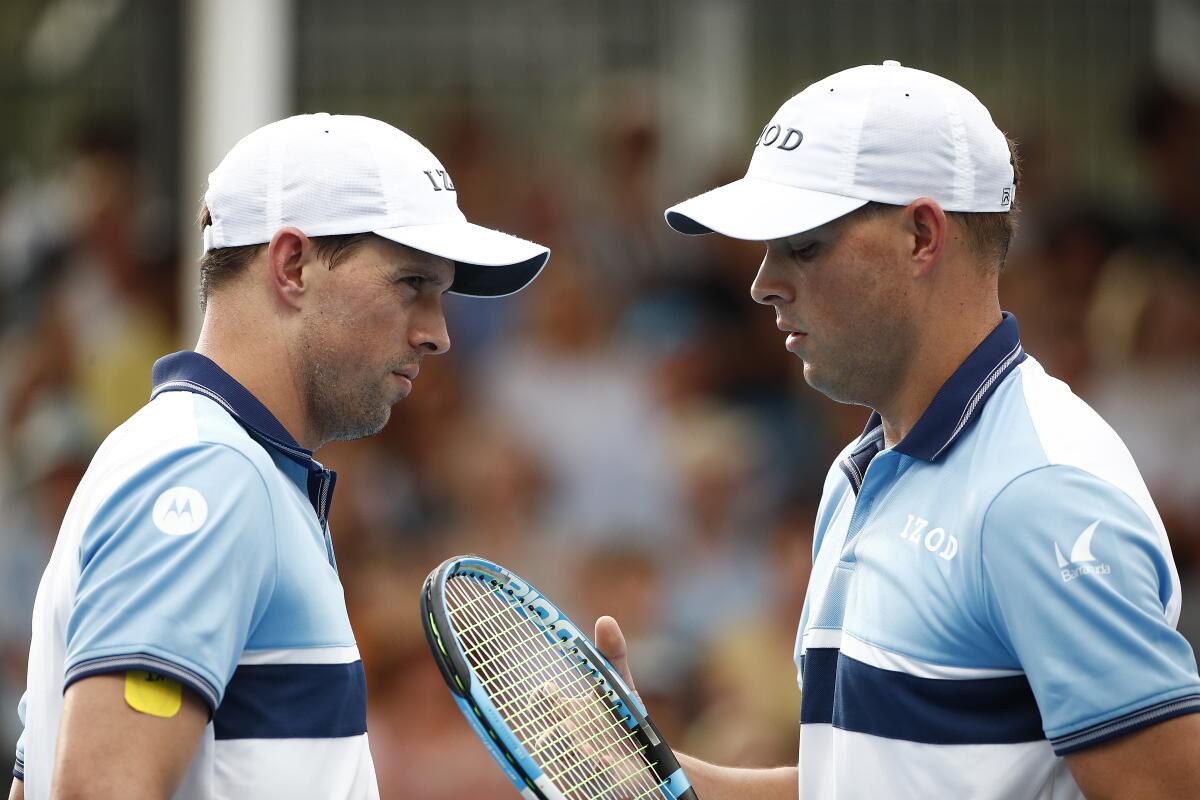
Life in duplicate will change in about seven months for the Bryan twins, Bob and Mike of pro tennis doubles fame.
Late last year, they announced that this would be their last season, that they would retire at the U.S. Open this summer in New York. The announcement was made on the Tennis Channel, with a kind of overlapping, fill-in-each-other’s blanks narrative. One made a point; the other elaborated.
Which figures. They are 41. They have won 16 major men’s doubles titles and 120 pro titles together, including Delray Beach on Feb. 23.
Together. That is the key word. They are identical and inseparable. They spent two years at Stanford. By school rules, they weren’t supposed to live together. But when Mike settled into his room, Bob bought a mattress and moved in.
They were raised by active tennis parents. Wayne is a lawyer, tennis promoter and former coach in World Team Tennis. Kathy played four times at Wimbledon. The boys grew up in a home in Camarillo with a grass tennis court in the yard but no television sets in the house. They grew to love tennis like they grew to like other things. Similarly.
“To this day,” Wayne says, “they call on the phone, and I’m never immediately sure which one it is.”
Maria Sharapova’s on-court success automatically qualifies her for the Hall of Fame, but her PED suspension should keep her out.
Years ago, tennis fans started remarking that everything — gestures, head movements, facial expressions — were strikingly the same. Between points, the Bryans even bounced around the court in perfect symmetry.
“Somebody told us about that and we finally looked at some film and, yeah, it was kind of scary,” Bob says.
Interviewing them is a challenge because they sound the same, look the same (6 feet 3, lean and handsome) and have the same outlook on tennis and life. If they dressed identically, they would be impossible to tell apart.
Several years ago, after a formal U.S. Open interview session had broken up, Mike was asked when he was born. He replied April 29, 1978. Bob was then asked, “And what is your birth date?”
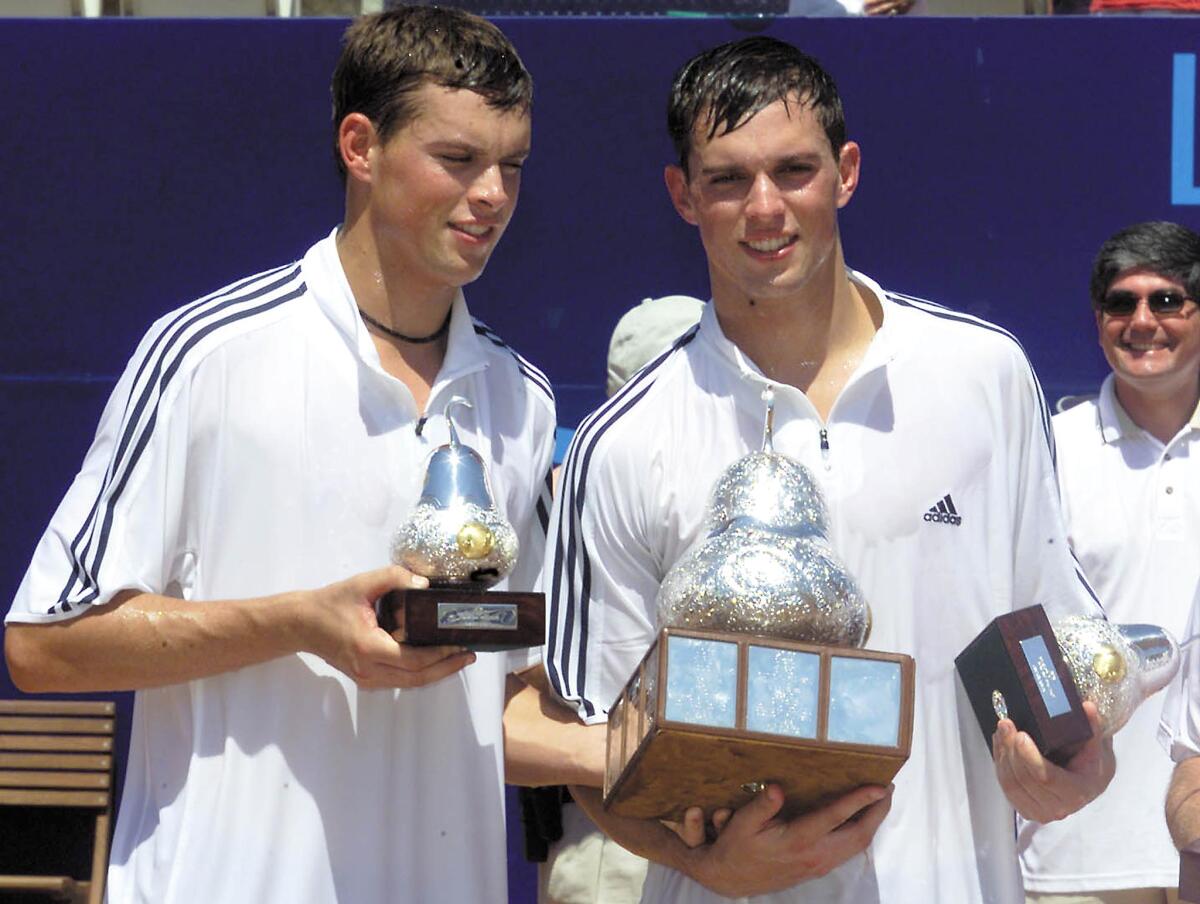
Bob is left-handed, Mike right-handed. That was perfect for tennis doubles. Opponents look at left-handed boomers from Bob’s serve and, two games later, face right-handed zings and totally different angles from Mike. Most often, by the time the opponents figure it out, the match is over.
Southern California tennis fans will get a chance for one last look at the Bryan brothers when they play next week at the BNP Paribas Open at Indian Wells.
Make that two last looks. They will play tennis and music. They have their own rock band called the Bryan Bros. They have played in the courtyard at Indian Wells for the last several years, and while they don’t play often, they will be on stage again Thursday, the opening day of the men’s main draw.
The music starts at 5 p.m. and a crowd as large as 5,000 is expected.
Their 2020 final go-around is focused on the Grand Slams and a few other major, and favorite, events. Indian Wells is high on that list.
“Hard not to like it,” Mike says.
“It’s one of the toughest doubles tournaments,” Bob says.
They both point out that, with a two-week event in a place now regularly referred to as “Tennis Paradise” — palm trees, picturesque mountains, usually perfect weather — even the big-name, star singles players hang around and play doubles.
The Bryan brothers have been in the Indian Wells final five times, have won twice (2013 and ’14) and have a good story about their first final there, in 2003.
“We got to the final that year,” Bob says, “and we were matched against Yevgeny Kafelnikov [of Russia] and Wayne Ferreira [of South Africa]. The day before the match, they came to us and said they were tired, had been on the road a long time and wanted to go home. Could we split the money and they would hand us the title?”
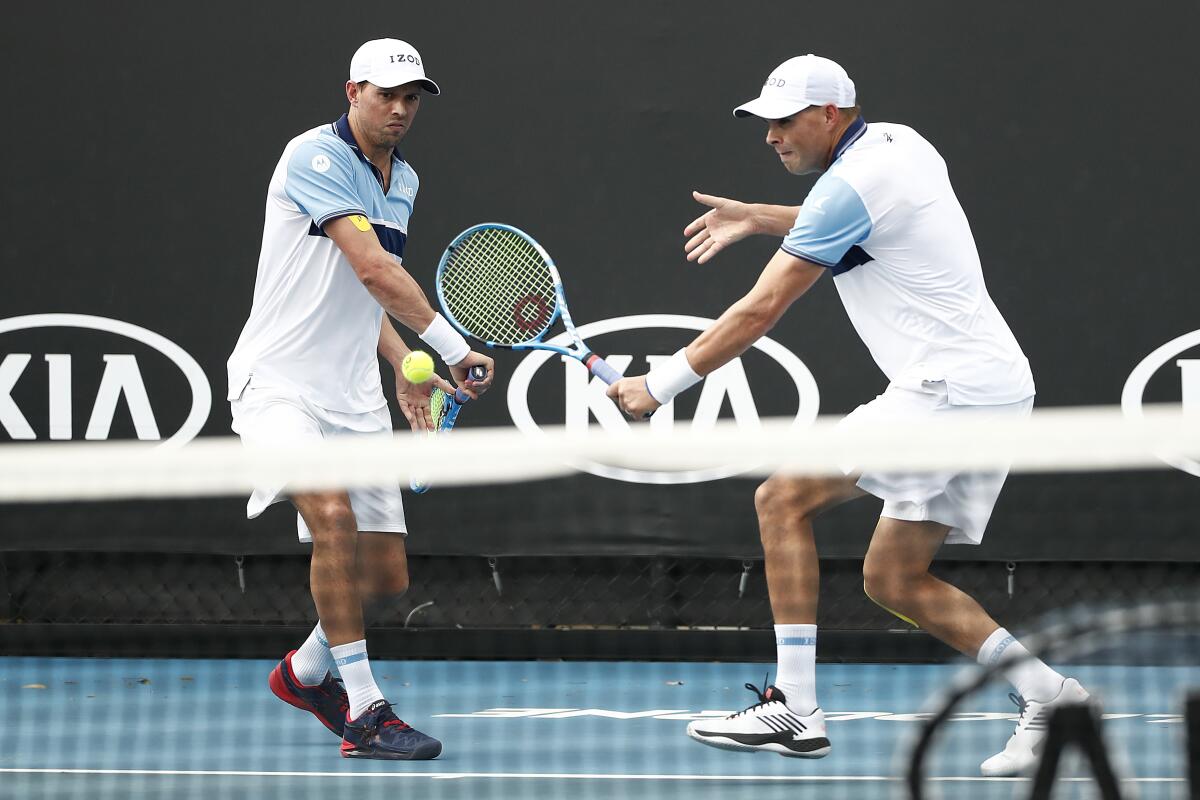
Mike picks it up: “We talked to our dad. We were 25 years old then and we came to the conclusion that we will win and wanted to do it on the court. So, we said no. We would play for it. We did. And we lost.”
The decision to play just one more season, even though they remain among the top doubles’ teams in the world, has much to do with Bob’s health.
In the spring of 2018, when they were back to No. 1 in the world and playing a match in the Masters 1000 event in Madrid, Bob’s long-nagging hip broke down.
“I heard it crunch,” he says. He hit a few more serves in the game and tried to come back out after a break. But it was over. The Bryan brothers, top team in the world for most of a decade, who had never quit in their previous 1,406 matches, defaulted.
“My phone blew up right away in the locker room,” Mike says. “Lots of fellow players were asking how Bob was and then, quickly, asking if I was looking for a new partner.”
The answers, in order, were: badly injured and yes.
Mike eventually settled on fellow American Jack Sock, while Bob struggled to figure out a way to get back on the court. That struggle eventually led to a relatively new surgical procedure that resurfaced his hip and did a partial hip replacement. It was done in August 2018 by New York surgeon Edwin Sue.
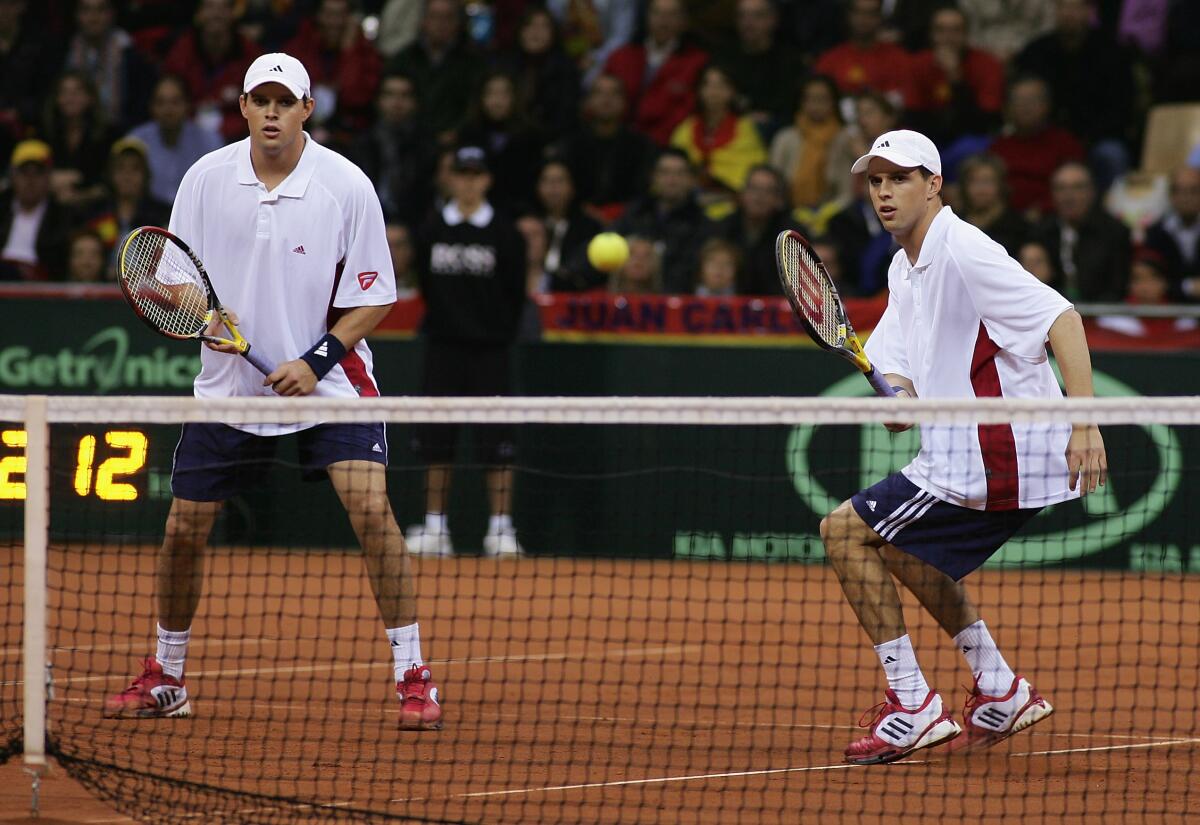
“He’s the best,” Bob said. “I was walking without crutches by Day 5.”
Mike, unhappy without his twin but more unhappy not playing, had a banner year. He and Sock won titles at Wimbledon and the U.S. Open, meaning Mike has won 18 Grand Slam men’s doubles titles and Bob 16.
Mike also has four major mixed doubles titles and Bob, seven.
“He’s still got me by one,” Mike says, almost proudly.
From his couch, Bob followed Mike’s success. When Mike won at the U.S. Open, Bob reached him courtside by phone.
“I was very proud,” Bob says.
“I was very happy, but I missed him,” Mike says.
So the future was set. Bob didn’t want to end his career on the couch and Mike didn’t want to end his without Bob. Bob had been told by some doctors he might never play again, or even walk again. But by early 2019, he was back on the court three months ahead of the most aggressive medical timetable.
In addition to offering fans refunds, the BNP Paribas Open will implement a variety of procedures aimed at helping attendees avoid contracting coronavirus.
The Bryans got to the quarterfinals of the event they have won six times, the Australian Open, and even won a couple of tournaments — Delray Beach and Miami. By last year’s U.S. Open, they were exhausted and decided to shut it down for the rest of the season and, to the surprise of many, give it one more go-around in 2020.
“If we had had, together, the kind of year Mike had with Jack Sock in 2018,” Bob says, “we likely would have shut it down then.”
As they explain their retirement plan in interviews, they say they have been doing this for 21 years, have been on airplanes every week for most of those years, will still compete hard and want to win as much as ever this season, but also want to look around, take in sights they never did before, and share all these “one-more-times” with the fans.
In essence, there is little more for them to achieve. Stanford won NCAA titles both years the Bryans were there, 1997 and ’98. In 1998, when they won the NCAA team title, they added the men’s doubles title and Bob won the rare collegiate Triple Crown when he took the singles title.
Besides their Grand Slam men’s doubles records — including a Bryan Golden Slam of four majors in a row and an Olympic gold medal — they won seven straight men’s doubles majors from the ’06 Australian Open to the ’06 Wimbledon.
They also have an Olympic bronze medal, a record 39 Masters Series 1000 titles and a Davis Cup title in 2007. In their career, they have won $37 million.
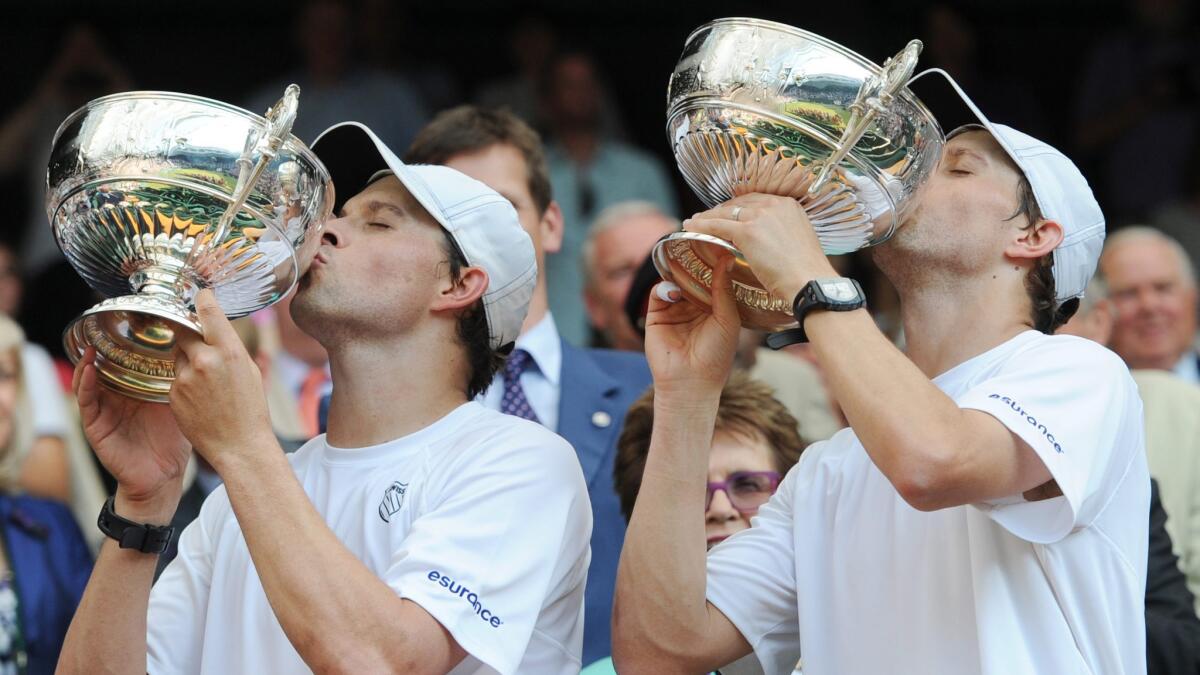
In various interviews about their last season, they have been asked if they were ever close to going in different directions with different partners.
“We never considered breaking up,” Bob says.
Mike nods.
When it ends in September at the U.S. Open — where they first played as 125-pound, 17-year-olds and got kicked off the practice courts because officials thought they were ball boys — Bob will come home to Camarillo and three kids under the age of 9 and Mike will be off for Hallandale, Fla., and a new baby, due this April.
More to Read
Go beyond the scoreboard
Get the latest on L.A.'s teams in the daily Sports Report newsletter.
You may occasionally receive promotional content from the Los Angeles Times.
